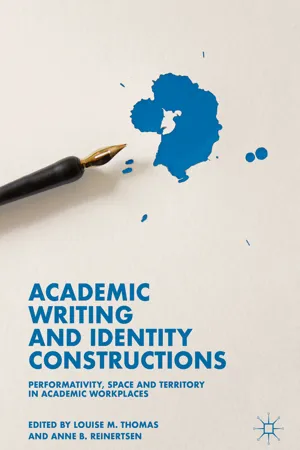Introduction
This book presents multiple takes on the notion of working the performance of academic-writer/thinker both inside and outside the academy. It takes as a point of departure university and, more broadly, academic-writing work contexts shaped by concepts such as ‘evidence-based, outcomes-driven research’, ‘big data’, and the increasing dominance of an academic culture driven by commodification, measurement and performativity. Our interest in this text is to open for consideration the possible erosion and weakening of the very foundations of academia and the extent to which this could lead to reductionism and instrumentalism in the performance of what it is to be academic writer and thinker. Simultaneously we point to the joy and potentiality of writing for/as innovation and knowledge creation, creativity, border-crossings, immanence and poetization. The writings in this book are minor and major, linear and nonlinear, straight and messy, modal and multimodal, accepting and resistant. Writing is life in the making, different genres producing different …, languages and writers breaking out of themselves.
In a polyfactual society in which factual knowledges originate from many and different places and spaces, and are often decentred and deauthorized, we wish to write and think from and with new thought-provoking deep theorizations. We wish for, and offer through this book, new contributions for rethinking and reconceptualizing tensions in the particular/universal, subject/object , individual/collective, knowing and not knowing, freedom and control relations. As academic writers, we work to present the complexities and multiplicities of our worlds. We invite the readers to think/read with and through new conceptualizations of what subjectivity, affect and agency might mean in polyfactual societies and in the actions of these societies. We see the combined works in this text as an ontology of/through writing which provides stories with-in and with-out, an ontology which also continues to allow for constant polycriticality, new hybrids of emergent theories and methodologies. We position writing as inquiry, as science, as art, as performance and as research, creating opportunities for multidimensional onto-epistemologies – opportunities for knowing through continual, ever-uncertain self-becomings. In our role as editors we engage with the writings in this text as continual processes and exchanges between us, our contributing authors, readers and back to us: a continual flow back and forth, an entanglement between us all in which the valuable places and spaces are the in-betweens.
Questioning the Academic Machine in Different Ways and for Different Purposes
In this book we work with and question (without the need to necessarily answer) how shifting contexts give shape to (or not) spaces for academics as writers, thinkers, constructors of ‘self’ in the continual processes of becoming. From a dualistic perspective that the personal is political and that the political is personal, this text attempts to work with and against categorizations (e.g. gender, race, class, in/out/other) which are present (at times explicitly and at other times more implicitly) in the performance of being and constantly becoming academic-writer. With this in mind, the evolution of this book is in response to the following (and more) questions: Does daring openness to uncertainty in a performative/audit driven institutional culture, risk the erosion of something, the dominance of something, the possibility of something? Is such risk-taking to be embraced or avoided – or both, or neither? Does openness to uncertainty build resilience/vulnerability? What might resilient/vulnerable bodies produce? Will a rise in alarmist notions of postfactuality lead to expectations of compliance with certain knowledges (and the certainty of knowledge) and risk an inward erosion of the academy and a constriction on what it means to be academic-writer?
Our particular interest is to open for consideration the possible impact on the very foundations of academia when such shifting contexts and expectations are not questioned. The contributors to this book consider the extent to which this could lead to reductionism and instrumentalism in the performance of what it is to be writer and thinker and researcher, and they ‘speak back’ to this through writing their multiple experiences within and with-out the traditional academic context. We show the possibility of using writing to present timelines moving positively, diffractively and multi-directionally, avoiding limitations of either-or argumentation. Through such writings, standard categories – real, virtual, life, death, body, mind, conscious, unconscious, male, female, human, non-human, true, false – are broken and re-assembled in new ways.
In the field of the speaking/writing subject and the blind-spots of autonomy, we write with an aim to create, and continuously question , working for a polyconsensus society. We write to de-comfort ourselves, that is, to engage in a ‘stepping back’ from zones or experiences of comfort, letting go of dependence on the comfort of certainty. Thus, writing works to de-comfort our subjectivities and provide critical approaches in which we recreate ourselves and our pedagogies, sciences, institutions and systems again and again not to lose force, to create on the basis of always, uncertain knowledges.
Writing and/as Onto-epistemological Meta Meta Reflexivity
Through the various contributions to this book, grounded in situated knowledges and contexts, writing projects toward a different wor(l)ding. Such writing provides opportunities to radically stimulate different kinds of experimental practices and ways of thinking, probing imaginatively into scenarios that operate according to different ontologies/epistemologies , unsettling and de-comforting our certainties and common senses of ‘shared reality’. Thus, opening spaces for constant questioning of subtleties and complexities, and issuing an invitation to live de-comforting, multidimensional realities together.
If the constru...
